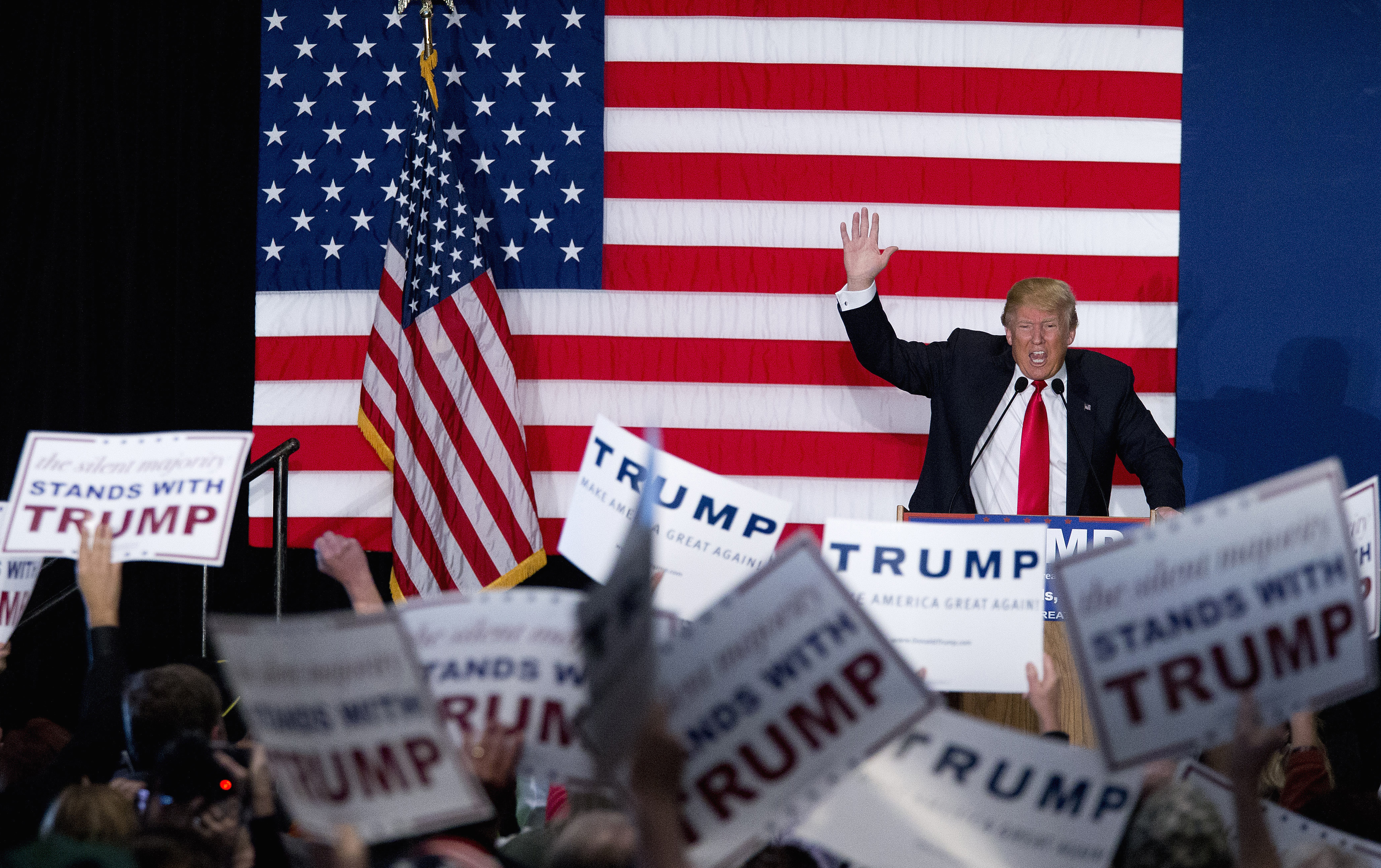Trump is a bad fascist. But what about the next one?
Things will never be normal again


A free daily email with the biggest news stories of the day – and the best features from TheWeek.com
You are now subscribed
Your newsletter sign-up was successful
We're just lucky that President Trump turns out to be such a bad fascist.
He certainly has the right temperament and inclinations. But he altogether lacks the commitment, the discipline and focus, the gumption to be a Stalin or a Pinochet. He never understood the mechanisms of democratic government well enough to successfully undermine them: He was outraged to learn that a lowly judge could countermand his fiats, that he doesn't automatically command the fealty of major departments and institutions, that he can't just fire anyone he wants. More importantly, he appears genuinely not to care about anything other than cashing in on this presidency gig for as much as he can while it lasts and having everyone pay attention to him all the time.
This should come as a relief to those of us who feared that Trump might actually mean all that crazy stuff he said about rounding up all the brown people and crushing the free press. But it must be something of a disappointment to his supporters, who hoped he might actually mean some of the crazy stuff he said about fighting Wall Street and bringing their manufacturing jobs back. The ominous fact is that, since Trump isn't going to build his wall or drain the swamp or fly around the world backward very fast and make the factories reassemble themselves from the rust, the frustrations and grievances that led to his election will remain unchanged, ready for the next demagogue to exploit.
The Week
Escape your echo chamber. Get the facts behind the news, plus analysis from multiple perspectives.

Sign up for The Week's Free Newsletters
From our morning news briefing to a weekly Good News Newsletter, get the best of The Week delivered directly to your inbox.
From our morning news briefing to a weekly Good News Newsletter, get the best of The Week delivered directly to your inbox.
The vague tacit hope among the saner two-thirds of the country is that this administration will be a brief, embarrassing historical aberration, we'll somehow get through it without this imbecile nuking Zurich in a fit of pique, and, once he's defeated or impeached, everything will go back to normal. Even a traditional rapacious warmongering woman-hating Republican administration seems comforting compared to the nerve-wracking rein of this diapered tyrant.
But this is the one thing we know is not going to happen. Things are not going back to normal — not now, not in 2020, not ever. The world has changed. The Trump administration (alarmingly, it's already sounding less absurd and surreal to say the words) is not just an aberration but an irrevocable break, a jagged discontinuity with the political realities we all grew up with and assumed were the natural topography of the world. What's razed and reshaped that world isn't this single inept and malignant administration, but the forces that foisted it into power. We have entered a new era, one that, despite a daily overload of smartypants analyses, no one yet really understands.
Based on the public writings of some DNC apparatchiks, the Democrats' strategy for 2020 seems to be that they'll do exactly the same thing they did last time, except they'll win this time, for some reason, and then they'll restore the good old status quo. If the Democrats revert to their standard "It Could Be Worse!" platform and run another "responsible," Wall-Street-vetted technocrat, they will lose again, deservedly, even to a grotesque joke like Trump. Hilary Clinton lost, among other reasons, because she was Ms. Status Quo 2016, and the status quo is not cutting it anymore. Trump's apocalyptic rhetoric, which sounded overblown and hysterical to coastal ears, seemed simply accurate to a lot of people out in Red America, where it's looking pretty apocalyptic.
"Back to Normal" is not an inspiring campaign slogan to these people. While their jobs went to Bangladesh and their kids were overdosing on opioids, liberals were taking towering moral stands over mandatory new pronouns and proscriptions on who's allowed to wear dreadlocks. These Americans have been ignored, patronized, and taken for granted for so long that they were easy marks for a pathetically obvious con man, because he was the only one in public view who was saying certain obviously true things: that the government is wholly owned by business interests and doesn't care what happens to people like them anymore. The fact that he was himself one of those business interests they chose to overlook, because they were desperate, and desperation makes people gullible.
A free daily email with the biggest news stories of the day – and the best features from TheWeek.com
The American government has been increasingly unresponsive to its electorate for decades, and had begun to seem as if it would never solve any national problem again: not health care or guns or climate change or infrastructure or institutional racism or growing inequality or campaign finance, the metaproblem that prevents all other problems from being solved. But it's finally beginning to look as if both major parties, long superannuated, might finally be moribund: the Republicans riven by internal conflicts in their unstable coalition of the greedy and the bigoted, and the Democrats enervated by their lack of any raison d'etre whatsoever. Now previously unthinkable proposals suddenly seem semi-plausible, scenarios both utopian and apocalyptic, from single-payer health care to gun control to nuclear war. It is one of those historic crises when seemingly unassailable institutions are exposed as hollow and rotten, and ordinary schlubs long resigned to impotence and apathy realize how shockingly easy they are to smash. Such times are hopeful; they are also dangerous.
Donald Trump isn't important; he isn't interesting. He is significant only as a symptom of the social pathology that enabled his victory. His disastrous presidency should serve as a scary object lesson, reminding us that America is as capable as any other nation, under certain circumstances, of electing a fascist. Fortunately Trump is an incompetent, and seems likely to self-destruct, hopefully without taking the rest of the biosphere with him. But he has demonstrated that a hate-mongering demagogue can win the American presidency — and when one person achieves something previously thought impossible, it suddenly makes it attainable for others, like running a four-minute mile, or successfully detonating an atom bomb. Other, smarter narcissists and psychopaths are doubtless eyeing his ascendancy, and learning from it.
Trump's failure may give us a brief reprieve, a narrow window of opportunity to replace the vacuum his grandiose cartoon promises will leave with actual solutions. Whatever the future brings won't be neoliberal capitalist business as usual; it also probably won't be European-style socialism. Hopefully it won't be some cool new rebranding of fascism, or a modern Dark Age. It'll be something different, something no one's imagined yet — maybe something that's already here, all around us, that hasn't been noticed or named. But unless either party learns anything from recent history, and can convincingly envision that future, the 2020 presidential field will again be full of equivocating nonentities, easy prey for another, more ambitious, more competent fascist.
Tim Kreider is an essayist and cartoonist. He divides his time between New York City and an Undisclosed Location on Maryland's Chesapeake Bay. His latest collection of essays is We Learn Nothing.
-
 How the FCC’s ‘equal time’ rule works
How the FCC’s ‘equal time’ rule worksIn the Spotlight The law is at the heart of the Colbert-CBS conflict
-
 What is the endgame in the DHS shutdown?
What is the endgame in the DHS shutdown?Today’s Big Question Democrats want to rein in ICE’s immigration crackdown
-
 ‘Poor time management isn’t just an inconvenience’
‘Poor time management isn’t just an inconvenience’Instant Opinion Opinion, comment and editorials of the day
-
 The billionaires’ wealth tax: a catastrophe for California?
The billionaires’ wealth tax: a catastrophe for California?Talking Point Peter Thiel and Larry Page preparing to change state residency
-
 Bari Weiss’ ‘60 Minutes’ scandal is about more than one report
Bari Weiss’ ‘60 Minutes’ scandal is about more than one reportIN THE SPOTLIGHT By blocking an approved segment on a controversial prison holding US deportees in El Salvador, the editor-in-chief of CBS News has become the main story
-
 Has Zohran Mamdani shown the Democrats how to win again?
Has Zohran Mamdani shown the Democrats how to win again?Today’s Big Question New York City mayoral election touted as victory for left-wing populists but moderate centrist wins elsewhere present more complex path for Democratic Party
-
 Millions turn out for anti-Trump ‘No Kings’ rallies
Millions turn out for anti-Trump ‘No Kings’ ralliesSpeed Read An estimated 7 million people participated, 2 million more than at the first ‘No Kings’ protest in June
-
 Ghislaine Maxwell: angling for a Trump pardon
Ghislaine Maxwell: angling for a Trump pardonTalking Point Convicted sex trafficker's testimony could shed new light on president's links to Jeffrey Epstein
-
 The last words and final moments of 40 presidents
The last words and final moments of 40 presidentsThe Explainer Some are eloquent quotes worthy of the holders of the highest office in the nation, and others... aren't
-
 The JFK files: the truth at last?
The JFK files: the truth at last?In The Spotlight More than 64,000 previously classified documents relating the 1963 assassination of John F. Kennedy have been released by the Trump administration
-
 'Seriously, not literally': how should the world take Donald Trump?
'Seriously, not literally': how should the world take Donald Trump?Today's big question White House rhetoric and reality look likely to become increasingly blurred
